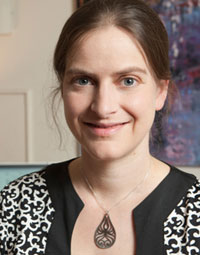Corinna E. Löckenhoff

Cornell University
http://www.human.cornell.edu/hd/healthyaging
What does your research focus on?
My research examines age differences in personality and emotions and explores their influence on health-related decisions and outcomes. A central goal is to understand how age groups differ in their approach to healthcare choices and to find ways to optimize such choices across the life span. Another line of my research examines life-long trajectories in people’s personality traits and their relation to mental and physical health.
What drew you to this line of research? Why is it exciting to you?
My interest in life-span development emerged from working as a nursing home aide in my late teens. It was fascinating to me how some residents managed to maintain emotional well-being and a rewarding social life in spite of physical and cognitive decline. This sparked my long-standing interest in the role of personality and emotion in late life.
Who were/are your mentors or psychological influences?
I was very lucky to be supported by a series of outstanding mentors. Early on, Gerhard Stemmler at Marburg University, Germany sparked my interest in experimental emotion research, and Steve Zarit at Pennsylvania State University convinced me to choose research over a clinical career. During my graduate years at Stanford, Laura Carstensen challenged me to think beyond chronological age and explore the true mechanisms behind age effects, and Al Bandura taught me how to move “onward and upward” after yet another failed pilot study. More recently, Paul Costa and Jeff McCrae at the NIH helped me appreciate the life-long role of five-factor traits. Now at Cornell, I continue to benefit tremendously from the advice and support of senior colleagues.
To what do you attribute your success in the science?
Settling on life-span development as a field of interest before I even finished high school has been very helpful in focusing my energy and making career decisions. Apart from that, whatever success I have had so far is based on the same components as for most other researchers: Scientific curiosity, an educational environment that allowed me to pursue my interests, helpful mentors, dedicated students, and — especially important for women scientists — a supportive family.
What’s your future research agenda?
My current work examines the role of affect in common behavioral economics tasks (e.g., temporal discounting). Although there is initial evidence that emotions play an important role in such tasks, the specific mechanisms and age-related changes in those mechanisms are not fully understood. In particular, I am trying to extend this work beyond monetary incentives to study outcomes relevant for mental and physical health such as emotional experiences or pain levels. In the long run, I hope to translate these findings to real-life settings and patient populations.
Any advice for even younger psychological scientists? What would you tell someone just now entering graduate school or getting their PhD?
The best advice I ever got was to pursue research on a topic that is truly fascinating to you, regardless of outside contingencies and current scientific fashions. Once you have found that topic, think, read, write, and talk about it a lot. Approach it from different angles and get as much feedback as you can. Much of my research benefitted greatly from insights offered by mentors, peers, and students.
What publication you are most proud of or feel has been most important to your career?
Löckenhoff, C.E., & Carstensen, L.L. (2004). Socioemotional selectivity theory, aging, and health: The increasingly delicate balance between regulating emotions and making tough choices. Journal of Personality, 72, 1393–1424.
Of course, my favorite paper is always the one that I just submitted. But seriously, the paper with the greatest influence on my research career was this conceptual paper that I wrote halfway through graduate school. Although I was not aware of it at the time, it laid out my research agenda for many years to come. Some of the studies I am working on today still have their roots in the thinking that went into that early publication.





APS regularly opens certain online articles for discussion on our website. Effective February 2021, you must be a logged-in APS member to post comments. By posting a comment, you agree to our Community Guidelines and the display of your profile information, including your name and affiliation. Any opinions, findings, conclusions, or recommendations present in article comments are those of the writers and do not necessarily reflect the views of APS or the article’s author. For more information, please see our Community Guidelines.
Please login with your APS account to comment.